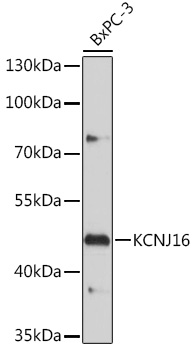Cell Biology Antibodies 15
Anti-KCNJ16 Antibody (CAB18635)
- SKU:
- CAB18635
- Product Type:
- Antibody
- Reactivity:
- Human
- Host Species:
- Rabbit
- Isotype:
- IgG
- Research Area:
- Cell Biology
Description
| Antibody Name: | Anti-KCNJ16 Antibody |
| Antibody SKU: | CAB18635 |
| Antibody Size: | 20uL, 50uL, 100uL |
| Application: | WB |
| Reactivity: | Human |
| Host Species: | Rabbit |
| Immunogen: | Recombinant protein of human KCNJ16. |
| Application: | WB |
| Recommended Dilution: | WB 1:500 - 1:2000 |
| Reactivity: | Human |
| Positive Samples: | BxPC-3 |
| Immunogen: | Recombinant protein of human KCNJ16. |
| Purification Method: | Affinity purification |
| Storage Buffer: | Store at -20°C. Avoid freeze / thaw cycles. Buffer: PBS with 0.02% sodium azide, 50% glycerol, pH7.3. |
| Isotype: | IgG |
| Sequence: | Email for sequence |
| Gene ID: | 3773 |
| Uniprot: | Q9NPI9 |
| Cellular Location: | |
| Calculated MW: | |
| Observed MW: | 48kDa |
| Synonyms: | |
| Background: |
| UniProt Protein Function: | Kir5.1: Inward rectifier potassium channels are characterized by a greater tendency to allow potassium to flow into the cell rather than out of it. Their voltage dependence is regulated by the concentration of extracellular potassium; as external potassium is raised, the voltage range of the channel opening shifts to more positive voltages. The inward rectification is mainly due to the blockage of outward current by internal magnesium. KCNJ16 may be involved in the regulation of fluid and pH balance. Belongs to the inward rectifier-type potassium channel (TC 1.A.2.1) family. KCNJ16 subfamily. |
| UniProt Protein Details: | Protein type:Membrane protein, integral; Membrane protein, multi-pass Chromosomal Location of Human Ortholog: 17q24.3 Cellular Component: integral to plasma membrane; plasma membrane Molecular Function:G-protein activated inward rectifier potassium channel activity; inward rectifier potassium channel activity Biological Process: potassium ion import |
| NCBI Summary: | Potassium channels are present in most mammalian cells, where they participate in a wide range of physiologic responses. The protein encoded by this gene is an integral membrane protein and inward-rectifier type potassium channel. The encoded protein, which tends to allow potassium to flow into rather than out of a cell, can form heterodimers with two other inward-rectifier type potassium channels. It may function in fluid and pH balance regulation. Alternatively spliced transcript variants have been found for this gene. [provided by RefSeq, Apr 2014] |
| UniProt Code: | Q9NPI9 |
| NCBI GenInfo Identifier: | 13878562 |
| NCBI Gene ID: | 3773 |
| NCBI Accession: | Q9NPI9.1 |
| UniProt Secondary Accession: | Q9NPI9,P52191, Q9Z307, |
| UniProt Related Accession: | Q9NPI9 |
| Molecular Weight: | 47,949 Da |
| NCBI Full Name: | Inward rectifier potassium channel 16 |
| NCBI Synonym Full Names: | potassium voltage-gated channel subfamily J member 16 |
| NCBI Official Symbol: | KCNJ16 |
| NCBI Official Synonym Symbols: | BIR9; KIR5.1 |
| NCBI Protein Information: | inward rectifier potassium channel 16 |
| UniProt Protein Name: | Inward rectifier potassium channel 16 |
| UniProt Synonym Protein Names: | Inward rectifier K(+) channel Kir5.1; Potassium channel, inwardly rectifying subfamily J member 16 |
| Protein Family: | Inward rectifier potassium channel |
| UniProt Gene Name: | KCNJ16 |
| UniProt Entry Name: | KCJ16_HUMAN |







